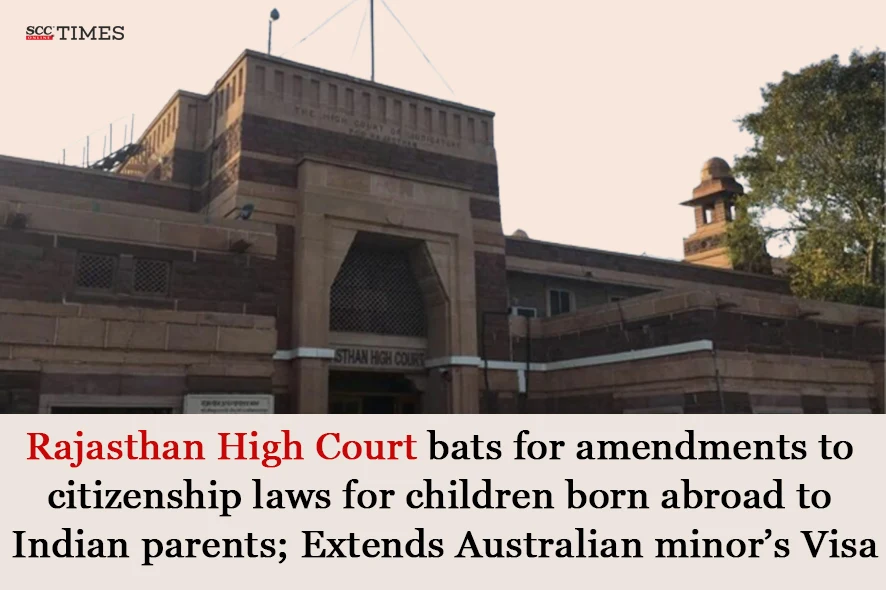Rajasthan High Court: In a civil writ petition filed by an Australian minor child born to Indian parents challenging the rejection of her visa extension application, a Single-Judge Bench of Anoop Kumar Dhand, J., directed the respondent to extend the petitioner’s visa without insisting on a No Objection Certificate (‘NOC’) from her mother. The court held that the best interest of the child is the paramount consideration and that a five-year-old girl, whose parents are Indian citizens, cannot be treated as an illegal migrant or be separated from her father due to matrimonial disputes. The Court further urged the Ministry of Home Affairs to look into the pathways to secure the best interest of such children born abroad from the wedlock of Indian citizen parents and revisit the relevant provisions of laws to make amendments where necessary.
Background
The petitioner is an Australia minor child born to Indian parents. She acquired Australian citizenship. The family later returned to India on a visa, which was subsequently extended until 21-01-2024. Matrimonial disputes arose between the parents, and the petitioner’s mother filed several cases, including criminal cases, against the father. The father applied for a further visa extension for the petitioner before the respondent, but it was rejected because the mother refused to provide an NOC. The petitioner apprehended that she would be treated as an illegal migrant and could face deportation without a valid visa. Aggrieved by the rejection of the visa extension for the petitioner by the respondent, the petitioner, through her father filed the present writ petition seeking extension of her visa and issuance of Overseas Citizenship of India Card.
Analysis and Decision
The Court noted that the question in the present petition was whether the petitioner’s visa can be extended for a further period or not, simply on the ground that her mother has refused to provide her NOC before the Foreigners Registration Office for extension of her visa.
The Court noted that if the petitioner’s visa is not extended, she would be treated as an illegal migrant and may face deportation in due course. The court emphasized that the best interest of the child is the paramount consideration for all nations and that India has acceded to the United Nations Convention on the Rights of the Child, 1989 (‘UNCRC’), which has prescribed a set of standards to be adhered to by all State parties in securing the best interest of the child. In this regard, the court perused Articles 3, 5, and 9 of the UNCRC, highlighting that the best interests of the child must be a primary consideration in all actions concerning children.
The Court noted that the Supreme Court in Union of India v. Agricas LLP, (2021) 14 SCC 341, and Apparel Export Promotion Council v. A.K. Chopra, (1999) 1 SCC 759, has held that principles of International Law will be respected and enforced so long as they are not in conflict with Indian laws.
The Court noted that Article 9 of the UNCRC mandates that a child should not be separated from their parents against their will, unless it is in their best interest. The Court observed that deporting the petitioner to Australia without ascertaining her wishes would not be in her best interest and would be in breach of Article 9. The Court further observed that Article 21 of the Constitution, when considered with the UNCRC, protects the minor from deportation.
The Court found the case to be unique as the father is unable to return to Australia, and the petitioner cannot reside with her father in India only because she holds Australian citizenship. This unique situation requires resolution by the respondents in accordance with the provisions of the Constitution and other relevant laws in this regard.
The Court noted that Section 4 of the Citizenship Act 1955 deals with the provision of citizenship by descent, where a child born outside India to an Indian Citizen may acquire citizenship by descent. Under Rule 3 of the Citizenship Rules 2009, a person can apply for registration of birth of his/her minor child born outside India in terms of sub-section (1) of Section 4 in Form I to the Consulate in the country where such child is born. Furthermore, the Ministry of Home Affairs, Government of India, has made online registration of births mandatory for all the children born abroad.
In light of the afore-stated facts and circumstances, the court directed the respondent to extend the petitioner’s visa for the maximum period prescribed by law, without insisting on the mother’s NOC. It also directed the petitioner through her father to apply for issuance of an OCI card, which the respondent shall consider and decide sympathetically and expeditiously, preferably within three months.
The Court observed that the,
“Ministry of Home Affairs, Government of India is expected to look into the pathways to secure the best interest of such children born abroad from the wedlock of Indian citizen parents and revisit the provisions of laws related to the issue, and if deemed necessary, make necessary amendments in the relevant laws to address the unique situations such as the one involved in this writ petition in the best interest and paramount consideration of the welfare of minor children born abroad to Indian citizen parents.”
The Court further observed that for the welfare and best interest of such children, the international legal framework must be revisited inasmuch as it is the need of the hour to call for action for countries to enhance cooperation and harmonize legal standards to better protect children. A robust and flexible convention is required to address these unique circumstances while ensuring that the child’s welfare remains the paramount consideration.
[Seher Gogio v. The Foreigners Regional Registration Officer, Frro Delhi, 2025 SCC OnLine Raj 3817, decided on 31-07-2025]
Advocates who appeared in this case:
For the Plaintiff: Rajesh Kumar Sharma, Kamini Pareek, Sarthak Chaubey, Advocates
For the Defendant: Devesh Yadav, Advocate



